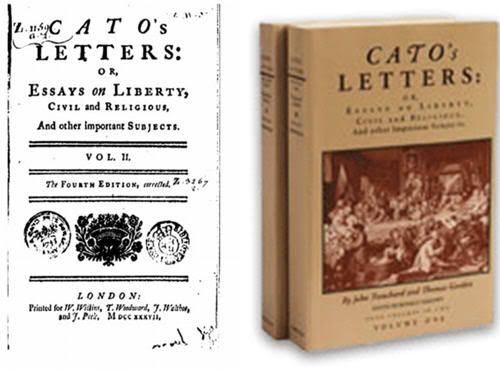
From the Essay Cato on the Evils of War and Standing Armies by Laurence M. Vance:
Cato’s Letters is a collection of 144 essays by Trenchard and Gordon that appeared in the London Journal and the British Journal between 1720 and 1723. They were published together beginning in 1724 as Cato’s Letters: Or Essays on Liberty, Civil and Religious, and Other Important Subjects. The essays were signed with the pseudonym Cato, after Cato the Younger, the foe of Julius Caesar and champion of liberty and republican principles. Cato the Younger was the great-grandson of Cato the Elder. His daughter married Brutus, one of the assassins of Julius Caesar. Cato’s life was immortalized in the 1713 play, Cato: A Tragedy, by the English playwright and essayist Joseph Addison (1672–1719).
...In Cato’s Letters No. 17, as an example of "what measures have been taken by corrupt ministers, in some of our neighbouring countries, to ruin and enslave the people over whom they presided," we read something strangely reminiscent of our own "leaders":
They will engage their country in ridiculous, expensive, fantastical wars, to keep the minds of men in continual hurry and agitation, and under constant fears and alarms; and, by such means, deprive them both of leisure and inclination to look into publick miscarriages. Men, on the contrary, will, instead of such inspection, be disposed to fall into all measures offered, seemingly, for their defence, and will agree to every wild demand made by those who are betraying them.
When they have served their ends by such wars, or have other motives to make peace, they will have no view to the publick interest; but will often, to procure such peace, deliver up the strong-holds of their country, or its colonies for trade, to open enemies, suspected friends, or dangerous neighbours, that they may not be interrupted in their domestick designs.
This theme is continued in Cato’s Letters No. 87:
I have often wondered at the folly and weakness of those princes, who will sacrifice hundreds of thousand of their own faithful subjects, to gain a precarious and slavish submission from bordering provinces, who will seek all opportunities to revolt; which cannot be prevented but by keeping them poor, wretched, and miserable, and consequently unable to pay the charges of their own vassalage; when, if the same number of men and the sums of money were usefully employed at home, which are necessary to make and support the conquest, they would add vastly more to their power and empire.

